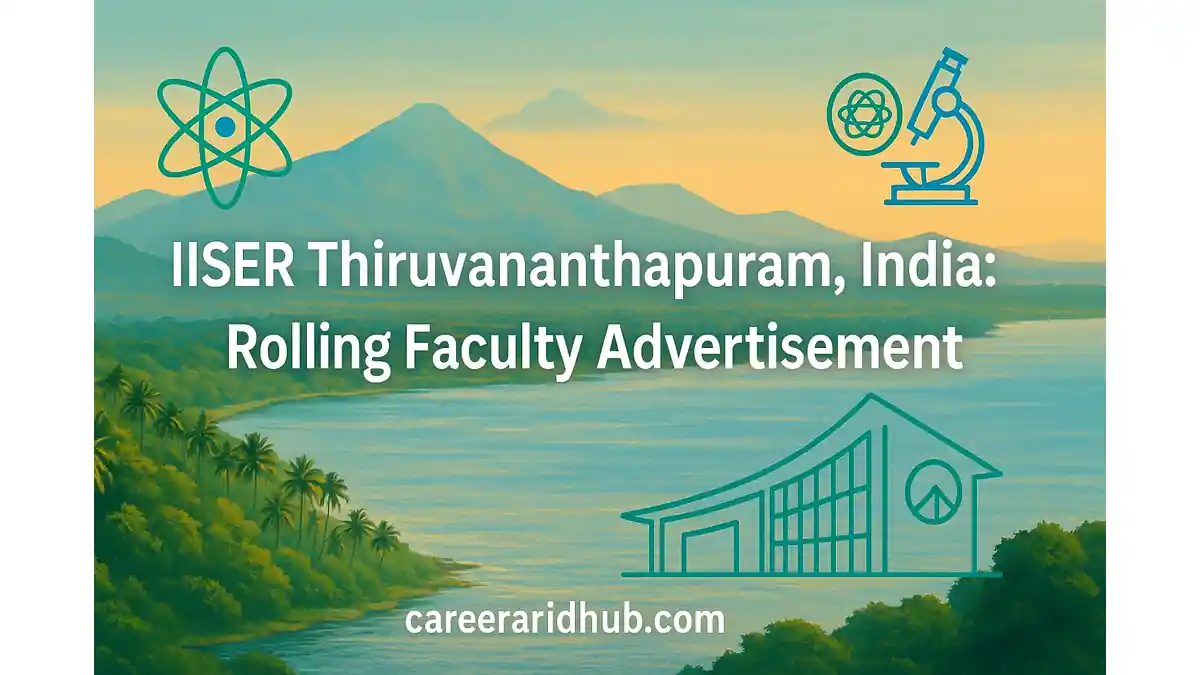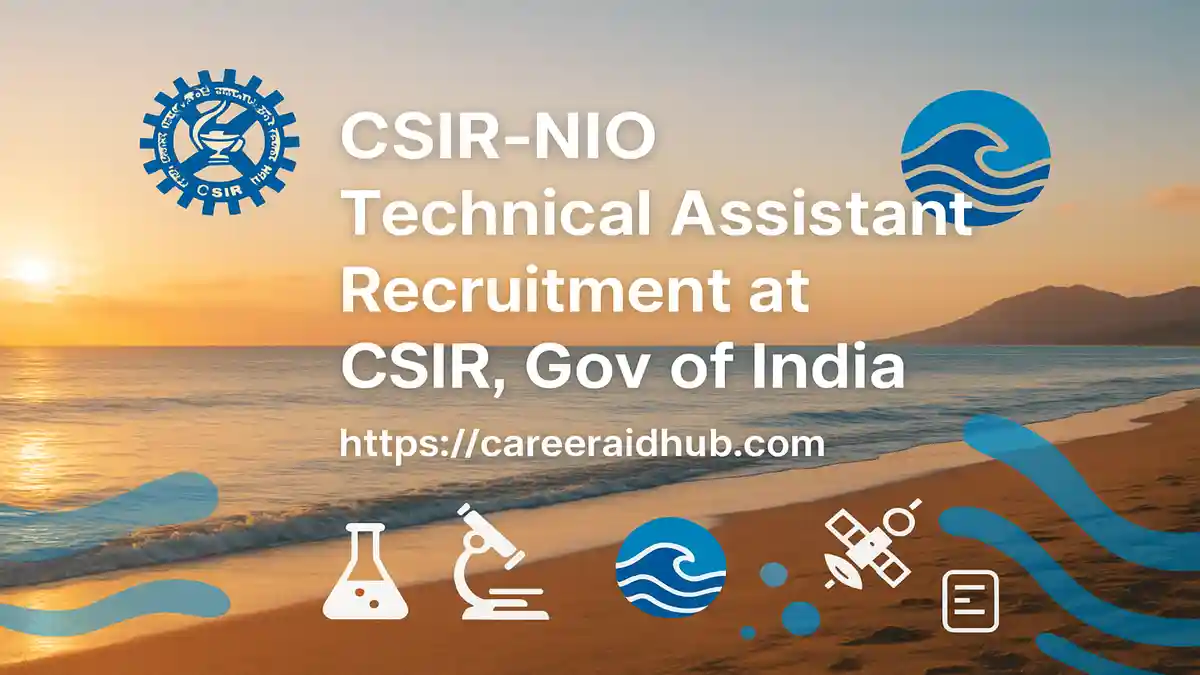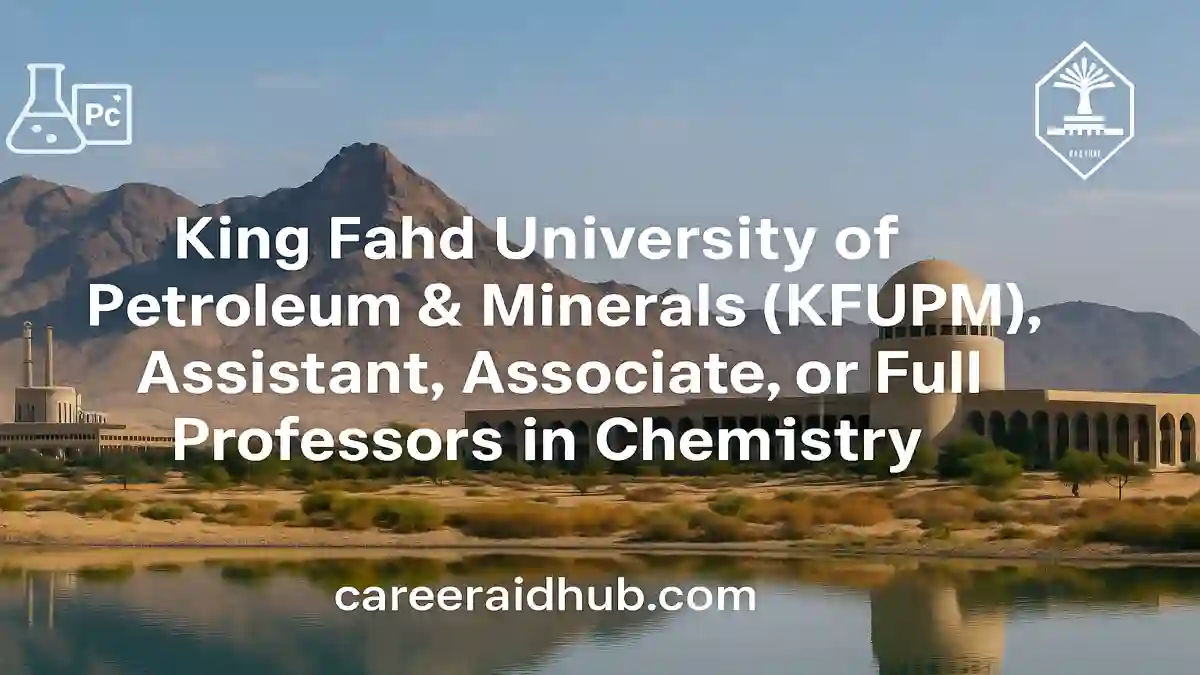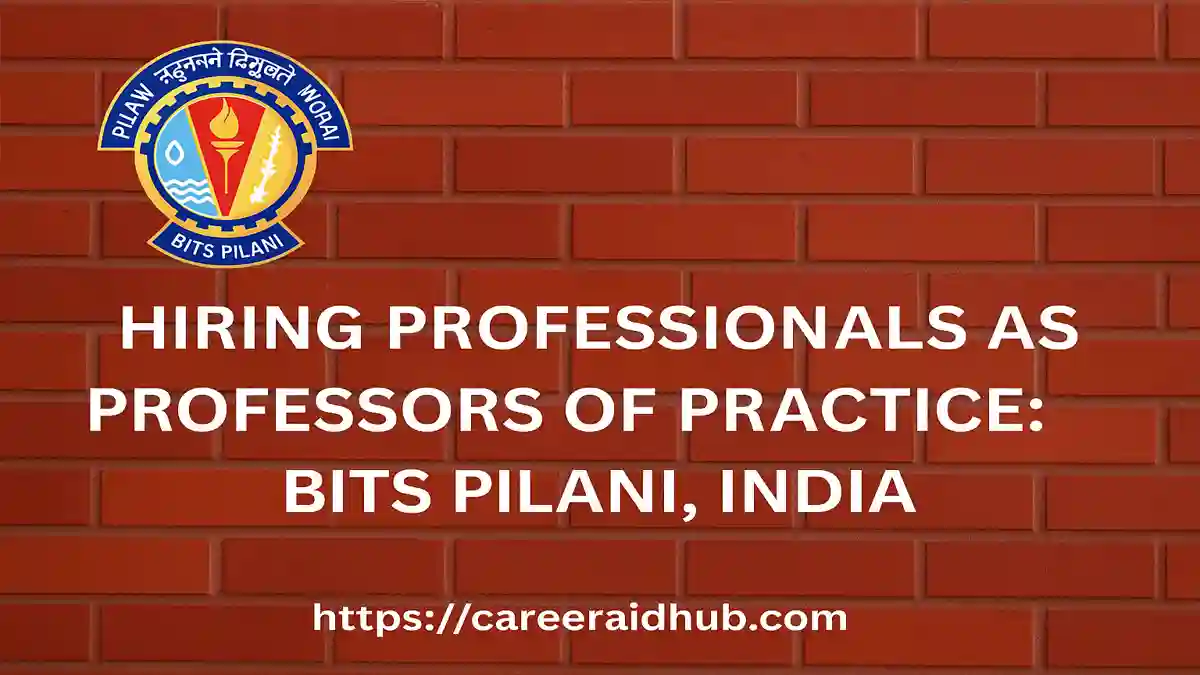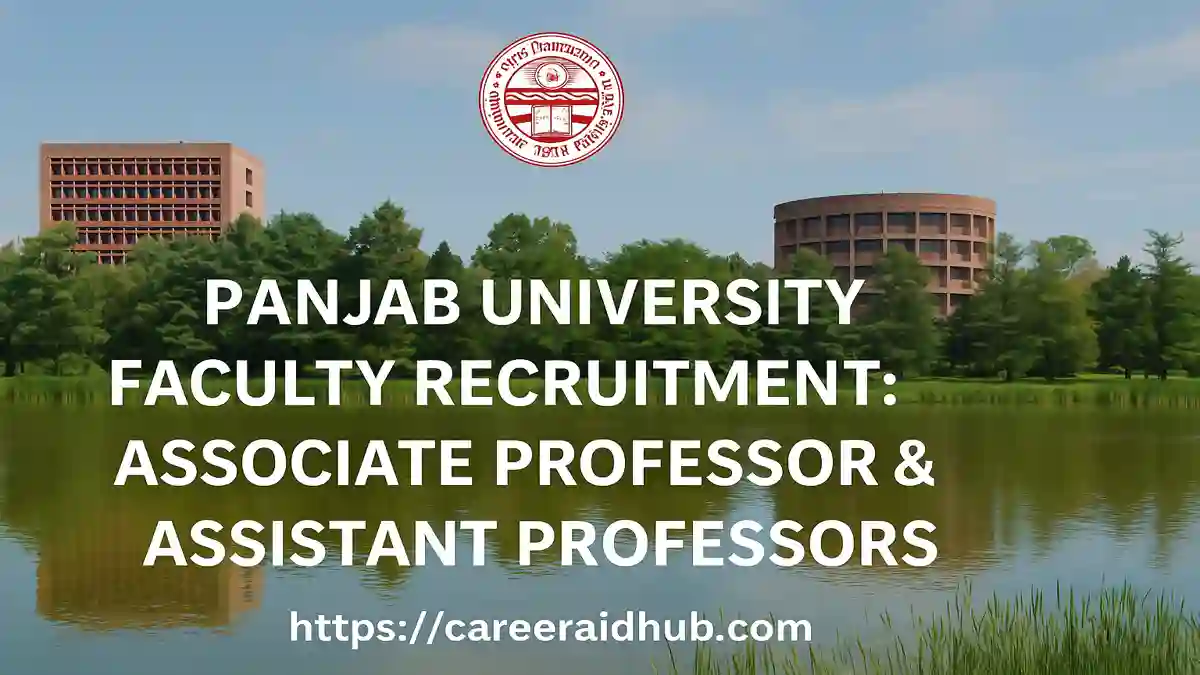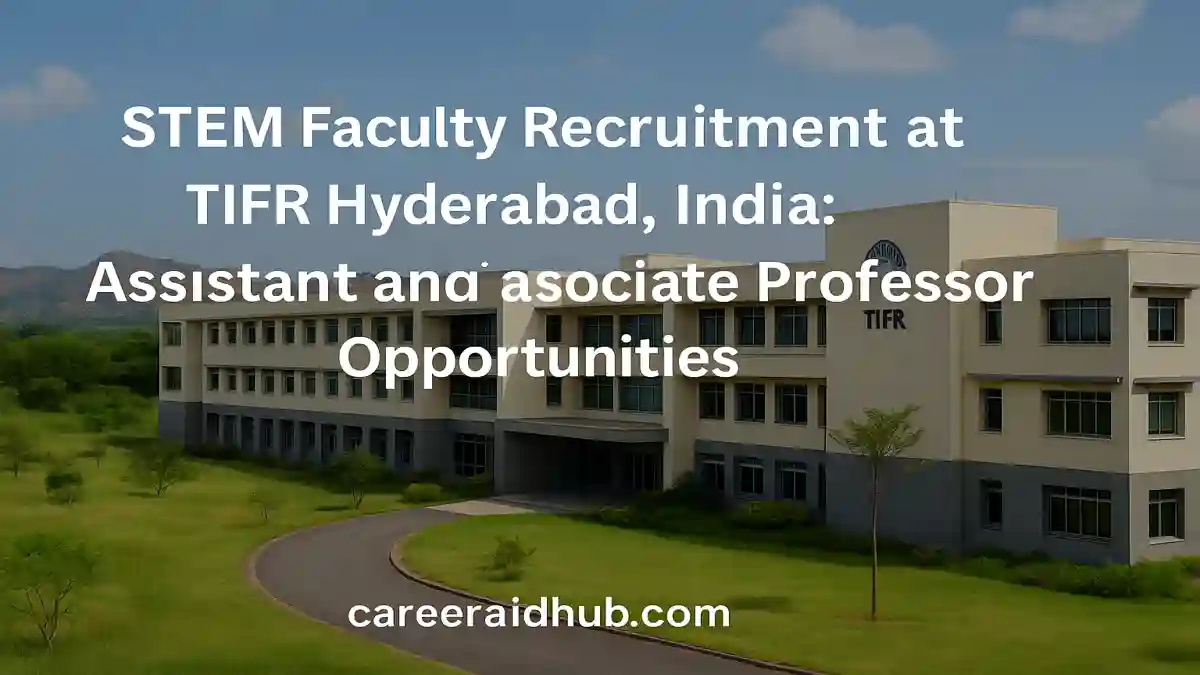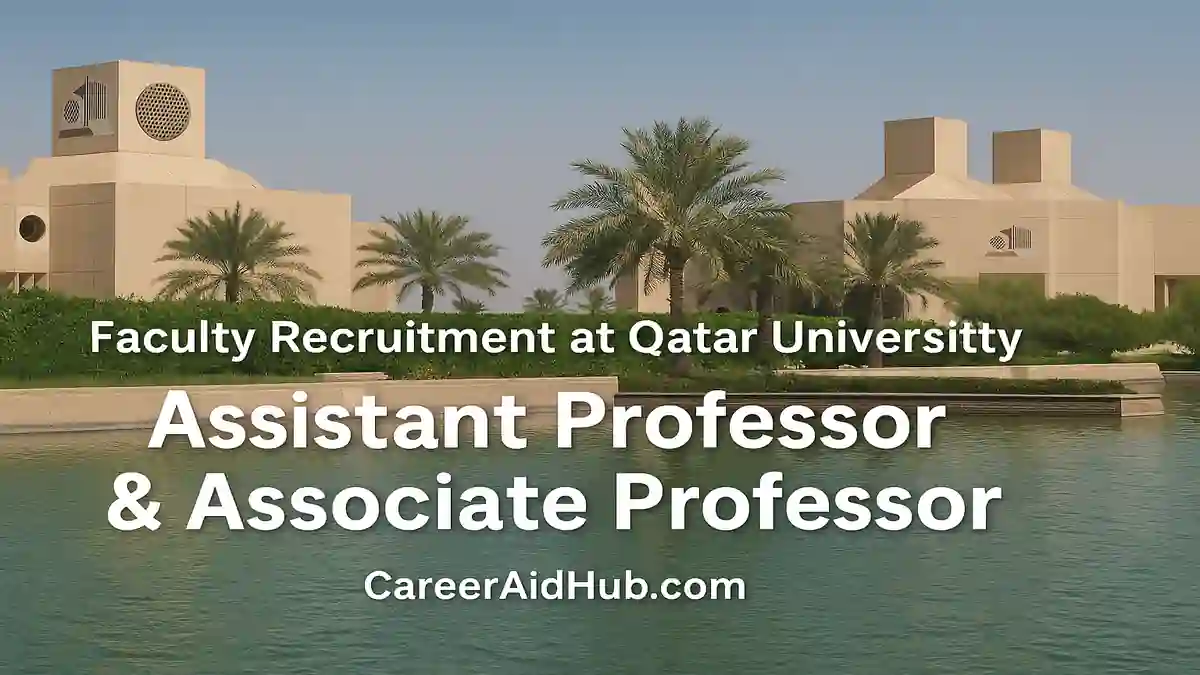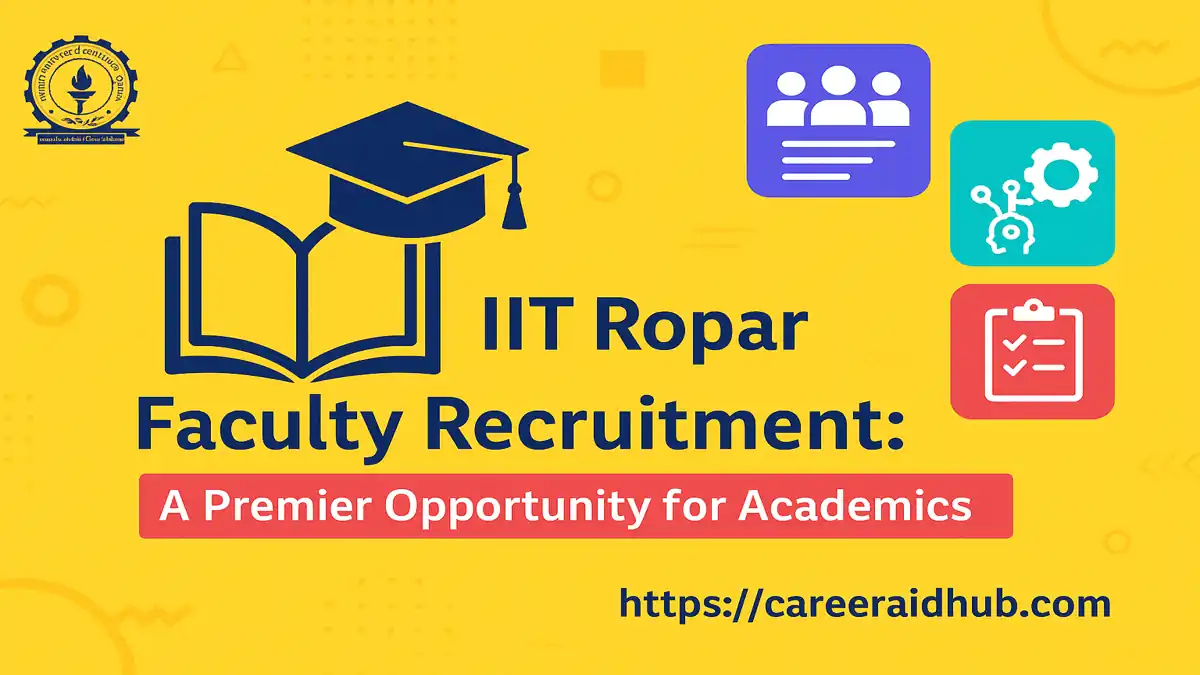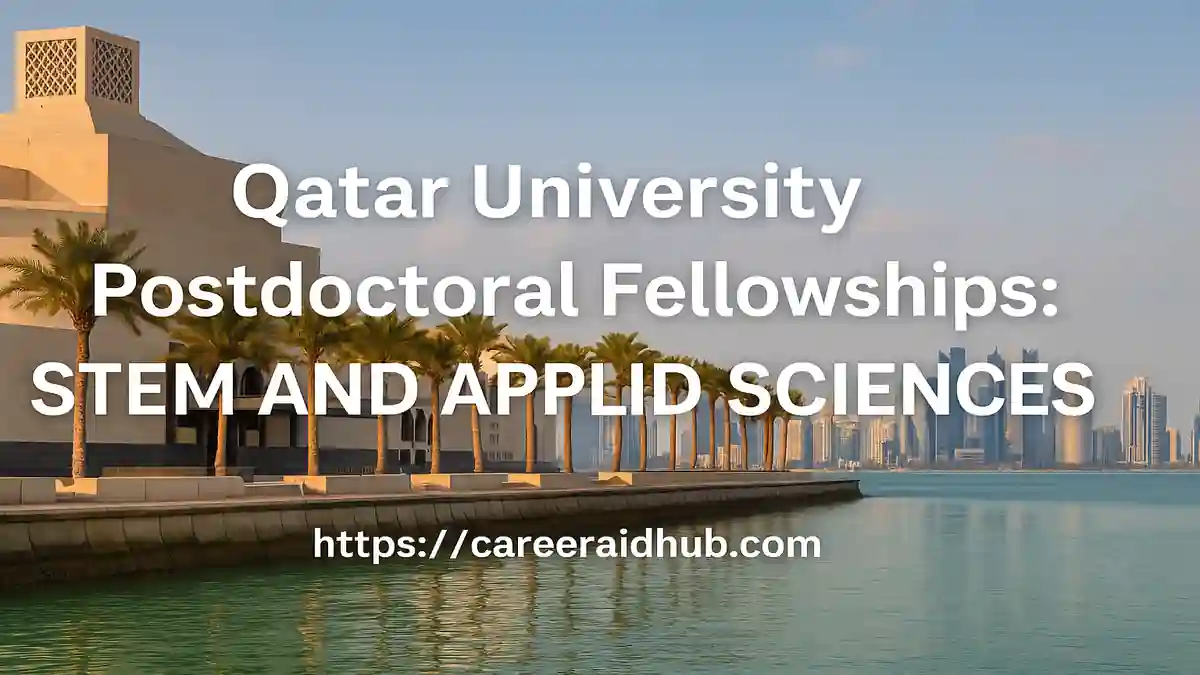IISER Thiruvananthapuram – Rolling Faculty Advertisement (2025): Portal Live; First-Batch Processing from 15 Oct
Why This Call Matters for Early-Career Faculty
IISER Thiruvananthapuram (IISER TVM) is among India’s premier research universities of national importance. The 2025 rolling advertisement offers a structured, tenure-track entry point (Assistant Professor Grade I) and a contractual pathway (Assistant Professor Grade II, where applicable) across the institute’s schools. Because applications are processed in batches, well-prepared early submissions benefit from faster consideration. Further, the institute explicitly emphasizes capacity to establish an independent research program, excellence in teaching, and a publication record in journals of international repute—core signals of readiness for faculty independence.
IISER Thiruvananthapuram invites exceptional scholars to apply for Assistant Professor roles under its rolling 2025 faculty call. The portal went live on 02 Sept 2025, with first-batch processing from 15 Oct. Prepare a sharp dossier, align with thrust areas, and time your submission to enter the earliest evaluation wave.
What “Rolling” Means in Practice
-
-
The portal opens for a window; completed applications received during that period form a batch.
-
During evaluation, the portal is temporarily closed; it reopens for a subsequent window.
-
Strong dossiers submitted early in a window are typically evaluated in the very next round, accelerating your timeline to interview and offer.
style="text-align: justify;">Positions, Tracks, and Tenure Progression
Assistant Professor (Grade I): Tenure-Track
-
-
Nature of appointment: Five-year contractual tenure track, followed by a comprehensive assessment for promotion to Associate Professor with tenure.
-
Typical profile: PhD with first-class standing at the preceding degree and a strong, field-specific research record. Post-PhD experience and evidence of independent scholarship significantly strengthen the case.
-
Trajectory: Scholars who demonstrate robust research output, external grant capture, effective teaching, and institutional engagement advance to tenure assessments with a clear pathway to long-term academic careers at IISER TVM.
Assistant Professor (Grade II): Contractual Pathway (When Advertised)
-
-
Nature of appointment: Contractual, usually three years, with performance-based progression policies distinct from the Grade I tenure track.
-
Typical profile: Fresh PhDs or very early postdocs with high potential and a clear plan to transition into a competitive Grade I portfolio.
-
Expectations: Rapid consolidation of publications, course contributions, and fundable research proposals that demonstrate momentum toward Grade I standards.
Schools and Thrust Areas (Apply Under the Most Relevant Track)
School of Biology
justify;">AI-enabled biology; infectious and lifestyle disease biology; organismal biology; multi-omics (metabolomics, proteomics, lipidomics, transcriptomics); biophysics and structural biology.
School of Chemistry
Polymer chemistry (emphasis on organic polymers); main-group and organometallic chemistry; rare-earths and precious-metal chemistry; sustainable/green chemistry; computational chemical biology; surface and interfacial chemistry; gas-phase spectroscopy; inorganic materials; advanced organic synthesis.
School of Data Science
Statistics (Bayesian, time-series, multivariate, spatial); AI/ML (including NLP and statistical machine learning); applied AI/ML in finance and economics.
School of Earth, Environmental & Sustainability Sciences
Atmospheric chemistry and pollution modelling; meteorology and atmosphere–ocean dynamics; metamorphic petrology; sedimentology, stratigraphy, geomorphology; geochemistry and geophysics; ore geology; planetary sciences.
School of Mathematics
Probability; combinatorics and graph theory; geometry; several complex variables; ergodic theory; operator theory and operator algebras.
School of Physics
Quantum devices (clean-room experience is a plus); quantum information theory; materials modelling; soft-matter experiments; experimental high-energy physics; energy materials and devices; quantum optics experiments.
Tip: If your specialization sits slightly outside a listed niche, consider applying under “Others.” In your research statement, directly map your expertise to existing strengths and outline synergies (shared facilities, complementary methods,
co-teaching opportunities).
Key Dates, Windows, and Submission Timing
-
-
Portal opened: 02 September 2025
-
First-batch processing begins: 15 October 2025
-
Rolling evaluation: Applications are processed regularly in batches; the portal is temporarily closed during evaluation and reopened for the next round.
Planning guidance: Submit a complete dossier well before a processing date to secure a place in that batch. If you miss it, aim for the subsequent window and use the interval to strengthen your materials (e.g., polish the research plan, update preprints to accepted papers, and refine course outlines).
Eligibility Signals and Ideal Candidate Profile
-
-
Academic excellence: First-class/equivalent at the preceding degree, PhD in a relevant area, and a coherent publication narrative.
-
Independent research vision: A 3–5-year plan that is fundable, methodologically sound, and infrastructurally feasible at IISER TVM.
-
Teaching readiness: Ability to teach core and elective courses, propose new modules that enrich curricula, and mentor students capably.
-
Institutional fit: Alignment with one or more thrust areas and willingness to collaborate across schools and centers (e.g., high-performance computing, advanced instrumentation).
How to Apply: Structure, Files, and Practical Checks
IISER TVM uses a two-part application supported by annexures. Create a private checklist to avoid omissions and to track file sizes.
Part I (Online Form)
-
-
Personal & academic details: Names, identifiers, degree chronology, category/PwBD status with supporting documents where applicable.
-
Supervisors & referees: Up to three PhD/postdoc supervisors; at least three referees (up to five). Choose referees who can attest to your independence, pedagogy, and field impact.
-
Discipline & area selection: Select your school and targeted thrust area(s) precisely, then ensure consistent terminology across your dossier.
-
Photo specs: Prepare a square JPG/PNG headshot that meets the portal’s file size and dimension limits.
Part II (Prescribed PDF)
-
-
Download the exact format from the portal. Fill it carefully, maintain the requested order, and export to a PDF within the specified size cap.
-
Consistency: Key numbers (citations, h-index, teaching hours, funded grants) must match CV and annexures.
Annexures (Curate for Clarity)
-
-
Research contributions: A narrative of your most important results, tools, datasets, and collaborations.
-
Five most significant publications: Combine into one PDF; add one-line context before each paper (problem, method, result).
-
Complete publication list: Separate peer-reviewed papers, preprints, conference papers, software, and datasets.
-
Research proposal: 3–5-year plan with aims, methods, risks, facilities, and work packages; include a one-page Gantt-style schedule.
-
Teaching proposal: Courses you can deliver immediately; advanced electives; laboratory modules; assessment philosophy.
-
Certificates: Degrees and transcripts starting from secondary school; ensure legibility.
-
Category/PwBD certificates: Where applicable, combine as instructed.
Communication: All official updates reach your registered email address. Whitelist the domain and check spam filters. If the portal temporarily closes, do not panic—use that period to strengthen your materials and return when the next window opens.
Evaluation, Interviews, and Tenure-Track Expectations
Screening to Seminar
-
-
Initial screening evaluates completeness, fit to thrust areas, and strength of scholarly record.
-
Seminar/interaction invites typically require a research talk accessible across disciplines and a focused technical discussion with the school’s faculty.
Post-Hire Accountability
-
-
Research: Maintain a steady pipeline—funding proposals (ANRF/SERB/industry), graduate recruitment, and consistent publications.
-
Teaching: Deliver core courses well and introduce distinctive electives that attract cross-school enrolments.
-
Service: Participate in committees, instrumentation stewardship, outreach, and collaborative initiatives that raise the institute’s profile.
For Grade I: A successful five-year dossier demonstrates field leadership, sustained output, and credible trajectory toward Associate Professor with tenure.
Strategy to Raise Your Odds (Actionable, Evidence-Based)
1) Time Your Application
Aim for a complete submission two to three weeks before a processing date. That cushion leaves room for referee delays and last-minute document corrections.
2) Map Your Fit With Precision
Mirror exact thrust-area language in your statement headings and figure captions. Then, articulate complementarities—shared laboratories, prospective joint grants, and cross-listed courses.
3) Make Annexure 2 Do the Heavy Lifting
Select five papers that collectively narrate a single, compelling arc: conceptual novelty → methodological rigor → demonstrated impact (citations, software adoption, standards contributions).
4) Write Fundable Proposals
Structure your research plan into 2–3 work packages, each with a hypothesis, method, milestones, and risks. Specify facility needs (clean-room tools, spectroscopy, HPC) and likely funders (e.g., ANRF, SERB). Include a brief data-management and reproducibility note.
5) Orchestrate Your Referees
Share your full dossier and a one-page “talking points” memo with referees. Encourage letters that independently corroborate originality, independence, and teaching promise rather than repeating your CV.
Conclusion: Enter Early, Apply Precisely, and Build Momentum
For ambitious scholars, IISER TVM’s 2025 rolling call is a timely route into a high-impact, research-intensive environment. Submit a tightly organized, field-aligned dossier before each processing window and use the intervening weeks to upgrade evidence—accepted papers, refined syllabi, and matured proposals. When each section of your application speaks to independence, fit, and fundability, you position yourself for a compelling seminar and a credible tenure-track start. Refer to the official rolling-advertisement page for live portal status, windows, and documentation formats.
Call to Action
Ready to compete in the first evaluation wave? Assemble your Part I, prescribed Part II, and all seven annexures this week. Share the final dossier with referees and submit before the next processing window opens. Then, keep improving your evidence while the evaluation proceeds.
Feature Snapshot
| Feature |
Details |
| Program Name |
Rolling Advertisement for Faculty Positions (IISERTVM/DoFA/REC/02/2025) |
| Host Country |
India |
| Funded By |
Indian Institute of Science Education and Research Thiruvananthapuram (MoE, Govt. of India) |
| Duration |
Assistant Professor Grade I: 5-year tenure track; Assistant Professor Grade II: 3-year contractual |
| Study Mode |
Full-time, on-campus faculty appointments |
| Eligibility |
PhD in a relevant field; strong research record; teaching capability; alignment with listed thrust areas |
| Financial Support |
Pay as per 7th CPC levels (Grade I typically at Level 12; Grade II when advertised as per notification), with allowances/NPS per institute norms |
| Fields of Study |
Biology, Chemistry, Data Science, Earth/Environmental/Sustainability Sciences, Mathematics, Physics |
| Deadline |
Rolling; first-batch processing from Oct 2025; Next review window: Jan 2026 (we will update soon) |
| Official Website |
Advertisement for Faculty Positions |
Frequently Asked Questions
What is the IISER Thiruvananthapuram rolling faculty advertisement? It’s a continuous call inviting Assistant Professor applications in specified thrust areas, processed in batches for periodic evaluation.
Which disciplines does the call cover? It covers Biology, Chemistry, Data Science, Earth/Environmental/Sustainability Sciences, Mathematics, and Physics.
What positions are invited under the call? The institute primarily invites Assistant Professor (Grade I); Grade II may open subject to institute notification.
Who is eligible to apply? Applicants should hold a PhD with a strong academic record and capacity to build an independent research program and teach effectively.
Does industry or postdoctoral experience help? Yes; relevant research, teaching, or industry experience strengthens your dossier for screening and seminar invitations.
How does the batch-wise processing work? The portal accepts applications, then temporarily closes while evaluators screen that batch before reopening for the next round.
Where do I submit my application? Submit through IISER TVM’s official online faculty recruitment portal.
Does the institute accept OCI/PIO applicants? Yes; the institute invites eligible Indian Nationals including PIOs and OCIs, as notified
What should my teaching statement emphasize? Highlight immediate core courses, innovative electives, assessment philosophy, and student mentoring plans aligned with school needs.

